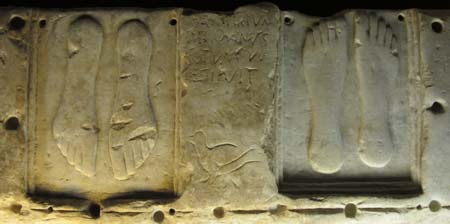iam mens praetrepidans auet uagari,
iam laeti studio pedes uigescunt.Exited thoughts now long to travel;
Glad feet now tap in expectation.Catullus, XLVI

Very early Thursday morning I will board a ferry in Plymouth, England, bound for Roscoff, France, thus embarking on what in common parlance is known as a holiday, though I hesitate to call it one per se, having recently re-read Roland Barthes essay, The Writer on Holiday. According to Barthes the holiday is a recent phenomenon, linked to the rise of the worker class. How very proletarian a notion: the holiday with pay. How very bourgeois of the reader to acknowledge with parsimony the prosaic necessities of the proletarianized writer, “that this phenomenon can henceforth concern writers, that the specialists of the human soul are also subjected to the common status of contemporary labour.”
“What proves the wonderful singularity of the writer, is that during the holiday in question, which he takes alongside factory workers and shop assistants, he unlike them does not stop, if not actually working, at least producing. So that he is a false worker, and a false holiday-maker as well. One is writing his memoirs, another is correcting proofs, yet another is preparing his next book. And he who does nothing confesses it as truly paradoxical behaviour, an avant-garde exploit, which only someone of exceptional independence can afford to flaunt. One then realizes, thanks to this kind of boast, that it is quite ‘natural’ that the writer should write all the time and in all situations. First, this treats literary production as a sort of involuntary secretion, which is taboo, since it escapes human determinations: to speak more decorously, the writer is the prey of an inner god who speaks at all times, without bothering, tyrant that he is, with the holidays of his medium. Writers are on holiday, but their Muse is awake, and gives birth non-stop.” [Barthes 27]
Fortunately, as it would appear from Barthes that – whilst their presumably female Muses are giving birth non-stop – all writers are men, many of these problems may not apply to me. I fully intend to read relentlessly on my holiday, but only books in which nothing much happens. On 22 July 2011 The University of Chicago posted a video of the Pearl Anderlson Sherry Memorial Poet Lecture presented 29 March 2011 by Lyn Hejinian, who spoke – quite brilliantly, I thought – on time in Gertrude Stein’s Lucy Church, Amiably. The title this early Stein novel refers to the site of both it’s writing and of it’s setting – Lucey, France. Gertrude and Alice purchased a holiday home in the region in 1926 or so. In the special perversity of writers in holiday homes, rather a lot of writing got done there. Discordant to the title of Hejinian’s paper, Lateness: The Latitudes Lucy Chruch, Aimably, I ordered the novel immediately and am highly anxious to have it arrive before I leave.
I do worry over the involuntary secretion Barthes mentions. It is my ardent hope that this blog post siphons off whatever excess travel writing tenancies may have built up in my system so that I depart having already written of travel and return refreshed to write of home. There are of course other secretions as involuntary as no less embarrassing than literary production to contend with when travelling. Perspiration, in particular. We become unaccustomed to sweating in England. When we travel to warm places we sweat copiously and spill foreign food items on our clothing at a rate directly proportional to the amount of fresh laundry we have left in our suitcases. I can’t remember where the narrator is travelling to in Lorie Moore’s brilliant short novel Who Will Run the Frog Hospital? because I read the novel whilst travelling and now have no idea where it is or if indeed I ever owned a copy. False holiday-maker, copious note taker, wherever I was when I read this book I find now that I copied then this, the most relevant of all possible (in this context) involuntary secretion quotations:
“My body fights travel, sends up the weapons of a homeless person, the boundaries thinly drawn, the body with its own knowledge, disorientations, defences: the winy sweat, the cheesy shit.”
In honour of Marshall McLuhan’s 100th birthday 21 July 2011 I re-read Understanding Media, in which McLuhan argues many half-mad half presciently brilliant things. Among them, he states:
“The book reader has always tended to be passive, because that is the best way to read.”
I completely disagree. In a typically proletarian writer on holiday way, even when I read for pleasure – a somewhat dubious distinction from the reading I do for research, which is almost entirely also done for pleasure – I read in a active, demanding, participatory, bordering on aggressive way. I underline passages, annotate margins, dog-ear pages, walk away, look stuff up, talk back to the book, talk about the book behind it’s back, and, if the book is any good, steal its best bits. The [generalized] bourgeois “book reader” McLuhan and Barthes both refer to is obviously not a writer. The writer reads on holiday. And, since, for the [generalized] writer, reading is a vocation, in reading as in writing, there can be no vacation.
The world vacation comes from the Old French word vacation, from the Latin vacti, vactin-, freedom from occupation, from vactus, past participle of vacre, to be empty, at leisure. The current French word for vacation is vacances and – to hell with Barthes – come hell or high water (though hopefully not high water as the ferry journey is a long one), as of very early Thursday morning, to the best of my abilities, I plan to be en vacances.
WORKS CITED
Roland Barthes, “The Writer on Holiday,” Mythologies,, NY: FSG, 1991
McLuhan, Marshall, Understanding Media, London: Routledge, 1964
Lorie Moore, Who Will Run the Frog Hospital?, NY: Warner Books, 1994